 Petzlover
Petzlover Harlequin Pinscher is originated from Germany but Spinone Italiano is originated from Italy. Harlequin Pinscher may grow 37 cm / 14 inches shorter than Spinone Italiano. Harlequin Pinscher may weigh 34 kg / 74 pounds lesser than Spinone Italiano. Harlequin Pinscher may live 6 years more than Spinone Italiano. Harlequin Pinscher may have less litter size than Spinone Italiano. Harlequin Pinscher requires Low Maintenance. But Spinone Italiano requires Moderate Maintenance
Harlequin Pinscher is originated from Germany but Spinone Italiano is originated from Italy. Harlequin Pinscher may grow 37 cm / 14 inches shorter than Spinone Italiano. Harlequin Pinscher may weigh 34 kg / 74 pounds lesser than Spinone Italiano. Harlequin Pinscher may live 6 years more than Spinone Italiano. Harlequin Pinscher may have less litter size than Spinone Italiano. Harlequin Pinscher requires Low Maintenance. But Spinone Italiano requires Moderate Maintenance
 This toy-sized dog is a type of Miniature Pinscher originating in Germany. The dog was developed by crossing traditional Miniature Pinschers with other toy-sized short-haired terriers. He falls into the Terrier category.
This toy-sized dog is a type of Miniature Pinscher originating in Germany. The dog was developed by crossing traditional Miniature Pinschers with other toy-sized short-haired terriers. He falls into the Terrier category.
The dog was used to kill rats, but has always been a devoted pet at the same time. They nearly became extinct after World War II, but the breed was once again restored. Today it is an established breed, but it isn’t recognized by any of the major kennel clubs.
In fact, The Harlequin Pinscher Association is the only breed club that recognizes the Harlequin Pinscher. It can be registered with the Harlequins Pinschers Association or with the American Canine Association.
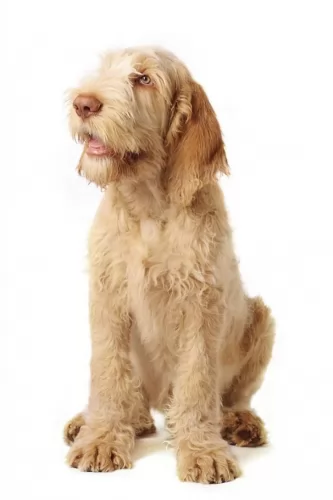 This Italian breed has an ancient blood line tracing all the back to 500 BC. Originally bred to hunt, he is today a friendly, alert and loyal companion. He is intelligent enough to do any job you give him. The Spinone is thought to be one of the oldest gun dogs ever, but it is not entirely clear that he came from Italy. There are some who think he may have come from somewhere in these European countries – Italy, Greece, France, Celtic Ireland, Spain or Russia. However, most believe the breed came from Italy in the Piedmont area.
This Italian breed has an ancient blood line tracing all the back to 500 BC. Originally bred to hunt, he is today a friendly, alert and loyal companion. He is intelligent enough to do any job you give him. The Spinone is thought to be one of the oldest gun dogs ever, but it is not entirely clear that he came from Italy. There are some who think he may have come from somewhere in these European countries – Italy, Greece, France, Celtic Ireland, Spain or Russia. However, most believe the breed came from Italy in the Piedmont area.
The most common thinking is that he is a descendent of the Spanish Pointer and/or the Russian Setter. One other theory is that setters from Greece were brought to the Roman Empire and crossed with a variety of Italian dog to make the coarse haired Spinone we see today. Then the French put in their claim that the breed is a cross of many French pointers.
The theory that counts might just belong to the Italians who believe the ancestor to the Spinone includes the German Wirehaired Pointer, the Pudelpointer and the Wirehaired Pointer. It was not until the 19th century that the name Spinone was officially given to the breed.
Before that it might have been known as a Spinoso and named after a thorn bus in Italy called the Spino. This bush was so thick and sharp that small prey animals learned to hide under it because the predators could not get through it. The Spinone however was able to fight through the briars with its thick, coarse hair and tough skin.
The breed almost became extinct during the second world war as before and after the hunters in Italy had started to use other breeds for hunting. Breeders also began to cross the Spinone with wire hairs like German Wirehaired Pointer, the Wirehaired Pointing Griffon and the Boulet.
The most popular hunting dog in Italy today is the Bracco Italiano while the Spinone is still used for hunting.
 This is a small compact dog standing at 25 – 33cm in height and weighing about 3kg to 4 or 5kg. He has dark eyes and ears which are set high and which are erect with just the top of them folding forwards.
This is a small compact dog standing at 25 – 33cm in height and weighing about 3kg to 4 or 5kg. He has dark eyes and ears which are set high and which are erect with just the top of them folding forwards.
The legs are straight and thin with small cat-like shaped paws. The tail is traditionally cropped, but these days the tail is left longer. He has a short coat which is available in a range of colors – black, brown, red, fawn patterns of merle, brindle or piebald. The Harlequin Pinscher is like a Bambi or a small deer, especially when they're a bit long in the leg.
Alert and inquisitive, the Harlequin Pinscher is a feisty, devoted little dog, brave and loyal and he has a lot of energy. He is intelligent too and with training and socialization, he becomes such a pleasure to have around, obedient and responding well to instructions.
He is known to be good with other pets as well as with children, so long as the children have been taught to respect animals. As always, a dog pretty much turns out the way the owners are, and with training and firmness while being patient and fair, you don’t have to worry about your Harlequin turning into a ‘small dog syndrome’ animal – whining, snappy and disagreeable. He is actually described as a big dog in a tiny dog's body.
The Harlequin Pinscher is a social dog and wants to be with you wherever you go.
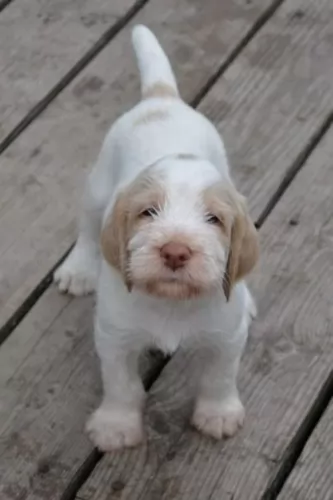 The breed is made up of strong, solid and muscled dogs that have an almost square build. His legs are made to travel any terrain and his head is long with an occipital that is pronounced and unique to the Spinone. They are said to have “human appearing eyes”, with a docked tail in countries allowing it and webbed paws.
The breed is made up of strong, solid and muscled dogs that have an almost square build. His legs are made to travel any terrain and his head is long with an occipital that is pronounced and unique to the Spinone. They are said to have “human appearing eyes”, with a docked tail in countries allowing it and webbed paws.
Shorter hair covers their feet, head, legs, muzzle and ears. They have longer hair on their eyebrows and it is stiff, with soft hair on the muzzle and cheeks with a beard and mustache. It is a single coated dog though the coat is rough. They should have skin, lips, nose, and pads in colors that coordinate with their coats. For white dog it is a red-orange color, brown in dogs that are roan colored and dark red-orange in the orange and white colored dog.
 The Harlequin Pinscher may have once been good at catching rats but these days they are much more sought after for their ability to be a splendid companion and pet.
The Harlequin Pinscher may have once been good at catching rats but these days they are much more sought after for their ability to be a splendid companion and pet.
He is such an entertaining, social little dog, wanting to spend as much time with you as possible. He is fearless, energetic, playful, confident, loving and intelligent and those who have owned them say they are courageous way beyond their size.
He is strong willed, stubborn and confident and this larger-than-life dog is just waiting to show you what a wonderful friend he can be to you too.
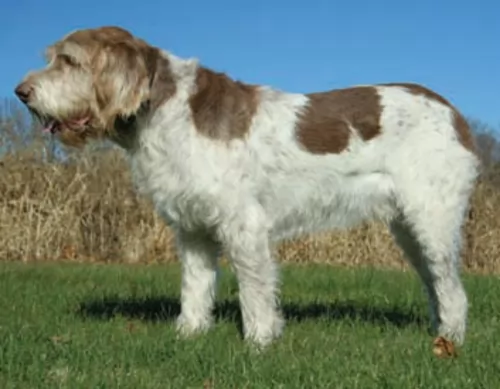 3.Adaptability – Young dogs need a lot of attention but they don’t need a lot of space. The young dogs are energetic while the adult dogs are laid-back. They need exercise every day and at least a small back yard.
3.Adaptability – Young dogs need a lot of attention but they don’t need a lot of space. The young dogs are energetic while the adult dogs are laid-back. They need exercise every day and at least a small back yard.
 Harlequin Pinschers, just like other dog breeds, have health issues that they are prone to such as epilepsy, dental issues, obesity and Patellar Luxation.
Harlequin Pinschers, just like other dog breeds, have health issues that they are prone to such as epilepsy, dental issues, obesity and Patellar Luxation.
Some seizures in dogs are genetic or related to illness. A dog could have ingested something poisonous while a head injury can also cause seizures in dogs. If your pet has a seizure you may notice foaming at the mouth, drooling or twitching of the legs.
After a seizure you could see your dog walking in circles and bumping into things. It is important to get your pet to the vet as soon as possible.
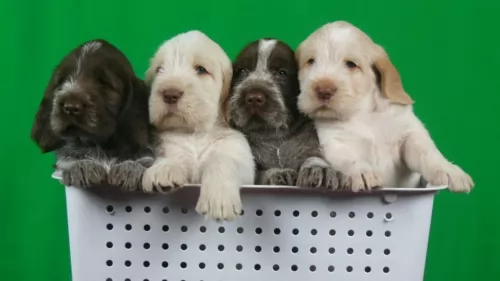 This is an ancient breed with not a lot of documented genetic issues, but it does have one deadly condition.
This is an ancient breed with not a lot of documented genetic issues, but it does have one deadly condition.
• Cerebellar ataxia (CA) is inherited and hits the puppies. Because it is a recessive gene both the mother and father must carry it for the puppy to inherit it. This makes it less likely than it would be otherwise. Puppies with the condition do not live more than a year. Since it is a genetic problem there is now a test for it that identifies carriers at a 95% accuracy rate.
• Like many other large breed dogs, they are susceptible to hip dysplasia. This can cause arthritis and/or lameness. There are now hip replacement surgeries available for this condition.
• Bloat is again common in large dogs and you need to watch for it with the Spinone. It can be deadly if not treated immediately. Let your dog rest quietly after eating. Do not let her exercise or play energetically after eating.
 The short, smooth coat of the Harlequin Pinscher is easy to maintain, shedding little. With such a small, nimble dog, you can even take a damp cloth and wipe him down. You can brush him down once or twice a week to keep his coat healthy and shiny.
The short, smooth coat of the Harlequin Pinscher is easy to maintain, shedding little. With such a small, nimble dog, you can even take a damp cloth and wipe him down. You can brush him down once or twice a week to keep his coat healthy and shiny.
Dogs can develop dental problems such as tartar and plaque build-up. and this can lead to canine dental problems which can turn life-threatening as bad teeth affect the heart, kidneys and the liver.
You need to brush your pet's teeth 2 or 3 times a week making use of canine toothbrush and toothpaste. Never use regular human toothpaste for your dog as it can be poison to him. It is why dry kibble is better than soft food as the soft food sticks to the dogs teeth.
Your Harlequin Pinscher is also a member of the toy breed group and he has high energy levels. Always choose a high quality kibble for a small dog breed and also which is in keeping with his age and activity levels. He will do well on a high quality dry commercial food, some raw meat or home-cooked food such as chicken, brown rice, pasta and vegetables. If your dog is an energetic dog, he will benefit from a diet rich in protein.
It will be tempting to feed your little pet tasty treats such as chocolate, nuts, coffee and milk but be careful as these can cause severe digestive problems with your dog.
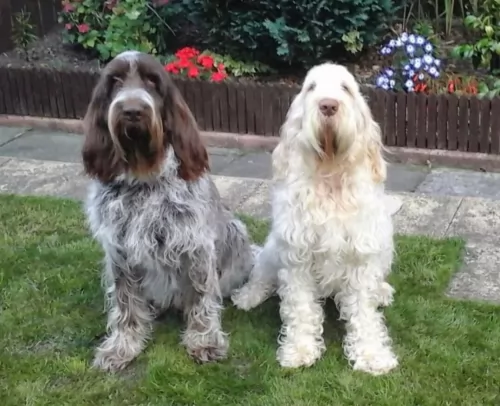 1Feeding the puppy – feed a high quality dog food for puppies of large breeds. Feed 3-4x day but don’t overfeed or let him exercise after eating even as a puppy.
1Feeding the puppy – feed a high quality dog food for puppies of large breeds. Feed 3-4x day but don’t overfeed or let him exercise after eating even as a puppy.
2.Feeding the adult - feed a high quality dog food for large breeds. Feed 1-2X day but don’t overfeed or let him exercise after eating.
4. Games and Exercises – The Spinone is an active breed, but not a fast dog. In fact, they like to travel at a trot so it becomes a great dog for jogging or running with. They love to jump, track, hunt, hike. They do well with agility, retrieving, flyball, carting, being a therapy dog, a rescue dog and a watchdog.